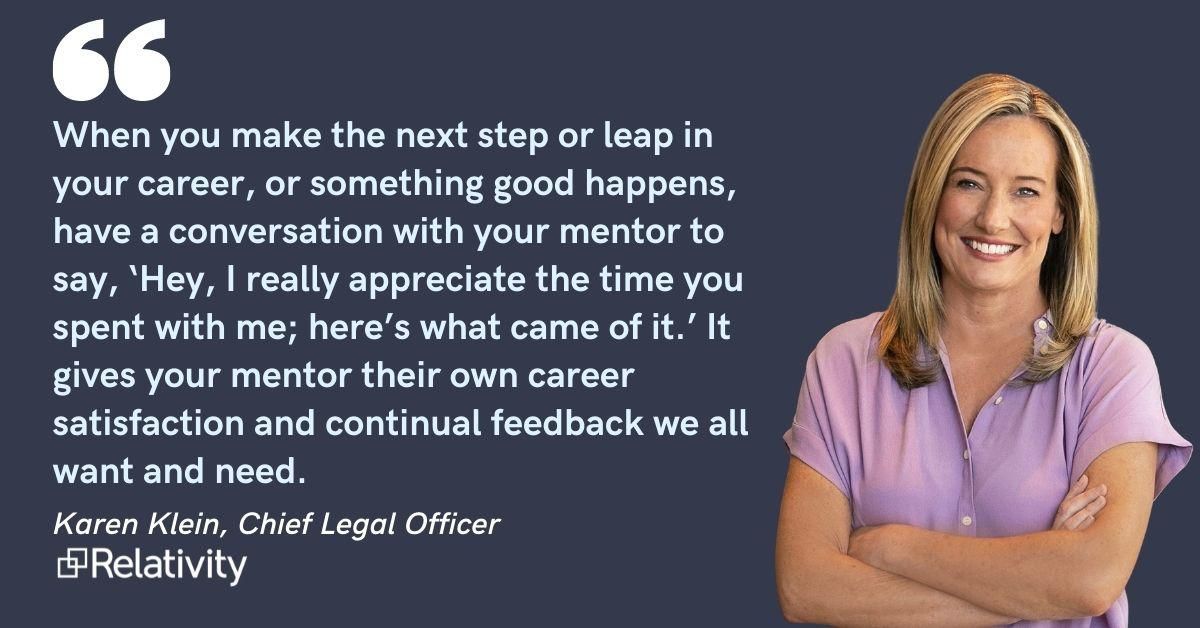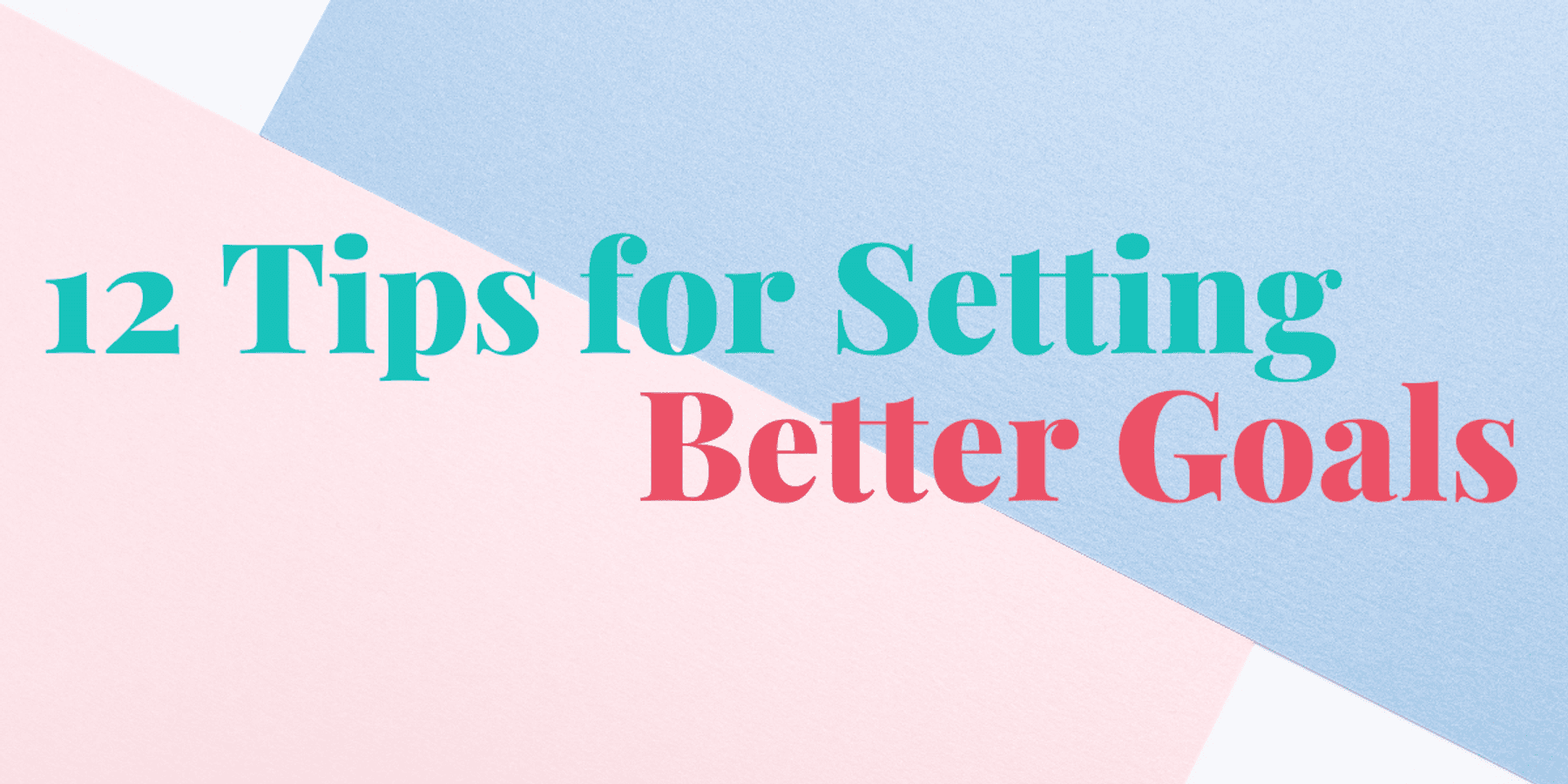Karen Klein wrote her first contract when she was 11.
It laid out how much allowance she would earn for completing certain chores each week. When she got her parents to sign it, she told them that she was going to be a lawyer when she grew up.
A decade and a half later, her mom brought out that piece of paper again—this time as a gift for Karen’s law school graduation.
Since then, Karen has written and reviewed a lot more contracts, as well as merger and acquisition deals, IPOs, and internal documents responding to regulatory bodies, including as the current Chief Legal Officer at global legal and compliance technology company Relativity.
While she set out on the path to be a lawyer of her own volition—“I was really good at arguing, and it got me into a lot of trouble at school, so maybe that’s where it came from!” she says, smiling—her career hasn’t been entirely self-directed. Karen attributes a lot of her success to having people believe in her and invest in her career, and we sat down with her to hear more about how she found those mentors and how she pays back their guidance by being a mentor herself.
In-House and On a Team
After finishing law school, Karen started her career at a law firm. That’s where she found her first mentor in one of the partners she worked for.
“I spent 90% of my time working for him, and he was a mentor before I even knew what a mentor was,” she says. “He not only assigned me great work, but he took the extra time to put things in context. After a meeting or a call, he’d sit and talk with me about what had happened, why the client asked the things that they did, why they were concerned, and ask for my perspective.”
Karen credits that mentor with helping her level up from being a person who executes well on tasks to being a person who understands strategically what needs to be done and why it matters. That knowledge set her up well for her next career step.
Even before joining the firm, Karen knew she’d one day like to move in-house. A self-proclaimed “deal junkie,” her favorite projects were ones that had her learn a lot about a client and their business in order to prepare a deal for them. “But then you wouldn’t hear from the client till the next deal, and I was like, ‘Well, I learned all about their business—I want to apply those things now,’” she says.
Being in-house would also let Karen fulfill what she describes as an inherited drive to build a business. “My parents owned and ran a construction company, and it stuck with me. I saw the stress that owning your own business created, but that mentality of building something and being part of something spoke to me,” she says. “The pride in helping to build something, that was enduring, and influenced me in ways I didn’t appreciate at the time.”
So when Larry—who was in-house counsel at a Chicago-based tech company, her then-firm’s largest client—called Karen and asked her if she’d like to join him there, she immediately said yes, though she did tell him that she knew little to nothing about technology.
“‘That’s okay,’” Karen remembers him saying. “‘You’re smart, you understand contracts and liability. We can teach you the tech part.’”
And teach her he did. That first move led to Karen spending 17 years in travel tech, including at places like Orbitz, Kayak, HotelTonight. Other general counsel she worked with became additional mentors, helping her come up the curve on regulatory issues and how to build a team.
A Full Circle Moment
When Relativity came calling, Karen had joined Ticketmaster only a year before, and was planning to stay there for the remainder of her career. It was pre-pandemic, and she was happy with the challenges and the teams she was building. She took a meeting with Relativity’s CEO just to get to know him as someone influential in the Chicago tech community that Karen so valued, and that was the beginning of her new job at Relativity.
“Once you meet Mike, you want to work with Mike,” says Karen, laughing. “It had this pull of nostalgia, that I could round out my career coming back to a Chicago software company, which is how I started out in-house. There were all these exciting things in store for the company, and it seemed right.”
Karen’s actual transition took a little longer—the pandemic had started, and she didn’t want to leave her team in its first few chaotic months—but she officially joined Relativity a year and a half ago, and now serves as its Chief Legal Officer and Corporate Secretary.
3 Lessons and 4 Tips for Mentorship
Reflecting on her career, Karen says she’s learned three main lessons from all the mentors that have guided her:
- How to embrace feedback. “I have some rough edges, and I had a CEO say to me once, ‘You know, Karen, you’re really effective, but you could be even more effective if…’” she says. “And that made me feel inspired to actually do better.”
- How to get outside of her comfort zone. Multiple mentors have told Karen she was ready to learn something new long before she knew that herself. “It was inspiring to me that he was willing to invite me along,” she says of one general counsel she worked for who gave her the opportunity to sit second chair while he navigated antitrust issues for the company.
- How to have faith in herself. “Everyone has to do something for the first time at some point,” says Karen of her fear of making the leap to senior positions like General Counsel and Chief Legal Officer. “Having people who put that faith and trust in me really helped me make leaps in my career I wouldn’t have otherwise been able to make.”
Though she’s now reached an apex in her career, Karen isn’t above seeking out new mentors—including her peers, like other executives at Relativity—and is certainly excited about being able to pay forward all that she’s learned. Her top tips for making the most of a mentorship relationship include:
- Build relationships everywhere. Finding mentors is all about having a connection with people, says Karen. “Trust lets you be comfortable reaching out and asking for that bit of advice, or to bounce ideas off of someone,” she says. “Whether you jump on the phone, or Slack someone, you want a connection that isn’t 100% about the transactional aspects of the work.”
- Agree on the goal. “Establish upfront what you both want from the relationship. What are you seeking from it? What will be in it for them?” she says. “Sometimes people are looking for a place to vent, but that’s not really mentorship.”
- Treat mentorship like a project. That means come prepared with agendas for every meeting, advises Karen. “I’m a list person, so I’ve written down lists of things I wanted some feedback on, or questions I had,” she says. “Of course, leave time for relationship building, to talk about how someone’s life is going. But have specific things that you’re hoping to get out of even a more casual conversation.”
- Circle back and share successes. “One of the biggest satisfactions mentors get is seeing career progressions,” says Karen. “When you make the next step or leap in your career, or something good happens, have a conversation with your mentor to say, ‘Hey, I really appreciate the time you spent with me; here’s what came of it.’ It gives your mentor their own career satisfaction and continual feedback we all want and need.”
If you’d like to find your next mentor at Relativity, check out their open roles!




